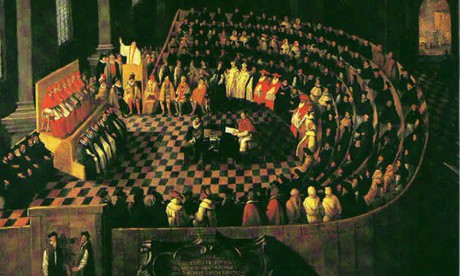The article Fr. Giancarlo Pani published in Italian Jesuit journal La Civiltà Cattolica before the Synod, regarding the exception the Council of Trent made for Greek-rite Catholics, withdrawing its condemnation of the Eastern practice of second marriages in 1563, has sparked a heated debate.
The article written by the Jesuit historian has attracted criticism not from another historian but from a moralist, the American E. Christian Brugger, who is Professor of Moral Theology at St. John Vianney Theological Seminary in Denver.
A clear response was published on Italian Vatican correspondent Sandro Magister’s website.
Dr. Brugger claims that Fr. Pani “defends the Greek matrimonial practice of “oikonomia” by which failed marriages can be dissolved and spouses permitted to remarry, or, what’s more often the case, to have their “new marriages declared valid” by the Church “after penance”.
He plainly hopes that this “tolerant tradition” may find its way into the Catholic Church.”
Fr. Pani was asked to comment on this criticism.
“Yes, I read Dr. Brugger’s response to my article.
“However, having read it, I got the impression that his comment was not directly linked to what I wrote.
“Perhaps the author had already prepared a broad-reaching text on the indissolubility of marriage, peppered with quotations and various reflections, and the article published in La Civiltà Cattolica simply provided the opportunity for him to make these opinions heard.”
Why do you say this?
“Brugger’s article wrongly attributes certain statements, interpretations, intentions, forms of manipulation, heresy and so on to me.
“I think that his long lecture is not aimed against me but against a decision taken by the Council of Trent. I am accused of not providing arguments to vindicate my claims.
“But I did not wish to vindicate any claims! Mine was a brief historical essay which aims to commemorate the historical event of 1563. I provided tools, facts, arguments and documentation.
“I also included footnotes with quotations from the Acts of the Council.
“My intention was to bring to light a piece of the Council’s history which remained forgotten for approximately 370 years, that is, between the end of the Tridentine Council and the publication of the Acts produced during the final session in 1932.” Continue reading
Sources
- Vassallomalta
- Image: Paper Masters
News category: Features.




